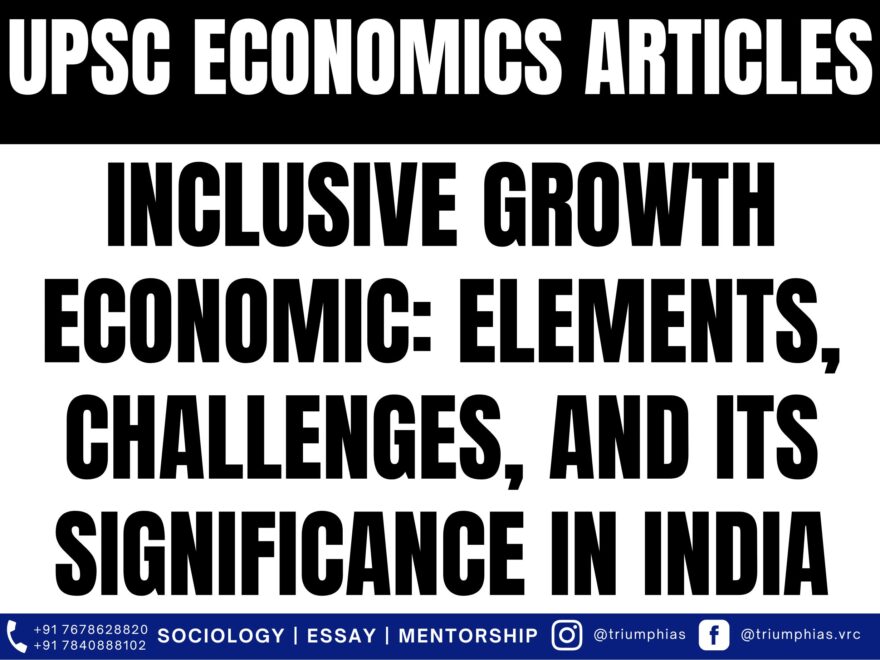Inclusive Growth Economics
(Relevant for Economics section of General Studies Paper Prelims/Mains)

Inclusive growth Economics refers to economic advancement that generates job prospects and contributes to poverty alleviation. It entails ensuring that individuals with limited means can access crucial healthcare and educational services. This concept involves offering equal opportunities and empowering individuals through education and skills enhancement.
Furthermore, it encompasses a growth trajectory that prioritizes environmental sustainability, aspires for effective governance, and contributes to the establishment of a society that values gender equality. According to the Organisation for Economic Co-operation and Development (OECD), inclusive growth denotes economic progress that is equitably shared across society and fosters opportunities for everyone.
Elements of Inclusive Growth
- Skill Development
- Financial Inclusion
- Technological Advancement
- Economic Growth
- Social Development
Challenges in Achieving Inclusive Growth Economics
- According to the Multidimensional Poverty Index (MPI) of 2018, India managed to uplift 271 million individuals between 2005-06 and 2015-16. The regions, social groups, and children facing the most severe poverty witnessed the most significant reductions. India displayed the most pronounced pro-poor trend on a sub-national scale.
- However, despite these substantial achievements, 373 million Indians continue to grapple with acute deprivations. Additionally, 8.8% of the population resides in a state of severe multidimensional poverty, while 19.3% remain vulnerable to it.
- The Periodic Labour Force Survey (PLFS) conducted by the NSSO reveals that the unemployment rate for the urban workforce was 7.8%, while the rural workforce faced an unemployment rate of 5.3%, resulting in a cumulative unemployment rate of 6.1%.
- India’s employment landscape suffers from both inadequate quantity and quality due to illiteracy and an excessive reliance on agriculture. The issue of employment quality is underscored by the fact that over 80% of individuals work within the informal sector without access to any social security measures.
- A substantial 44% of India’s workforce remains tied to agriculture-related jobs. However, its contribution to the nation’s GDP is merely 16.5%, contributing to widespread poverty.
- Regional disparities emerge as a significant challenge for India. Factors such as the caste system and the wealth gap contribute to these regional disparities, creating a situation where certain groups possess more privileges than others.
The Indian government, in conjunction with state and local authorities, must persist in its efforts to eliminate poverty and attain sustainable development, ultimately enhancing the well-being of the nation’s citizens. By fostering creative collaborations with global entities, non-governmental organizations, and private enterprises, it becomes possible to direct efforts towards achieving growth that is both inclusive and equitable.
To master these intricacies and fare well in the Sociology Optional Syllabus, aspiring sociologists might benefit from guidance by the Best Sociology Optional Teacher and participation in the Best Sociology Optional Coaching. These avenues provide comprehensive assistance, ensuring a solid understanding of sociology’s diverse methodologies and techniques.
inclusive growth economics, economic development, poverty alleviation, skill development, financial inclusion, technological advancement, economic growth, social development, multidimensional poverty, unemployment, informal sector, agriculture, regional disparities, caste system, wealth gap, sustainable development, equality, governance, India, Best Sociology Optional Coaching, Sociology Optional Syllabus.

Choose The Best Sociology Optional Teacher for IAS Preparation?
At the beginning of the journey for Civil Services Examination preparation, many students face a pivotal decision – selecting their optional subject. Questions such as “which optional subject is the best?” and “which optional subject is the most scoring?” frequently come to mind. Choosing the right optional subject, like choosing the best sociology optional teacher, is a subjective yet vital step that requires a thoughtful decision based on facts. A misstep in this crucial decision can indeed prove disastrous.
Ever since the exam pattern was revamped in 2013, the UPSC has eliminated the need for a second optional subject. Now, candidates have to choose only one optional subject for the UPSC Mains, which has two papers of 250 marks each. One of the compelling choices for many has been the sociology optional. However, it’s strongly advised to decide on your optional subject for mains well ahead of time to get sufficient time to complete the syllabus. After all, most students score similarly in General Studies Papers; it’s the score in the optional subject & essay that contributes significantly to the final selection.
“A sound strategy does not rely solely on the popular
Opinion of toppers or famous YouTubers cum teachers.”
It requires understanding one’s ability, interest, and the relevance of the subject, not just for the exam but also for life in general. Hence, when selecting the best sociology teacher, one must consider the usefulness of sociology optional coaching in General Studies, Essay, and Personality Test.
The choice of the optional subject should be based on objective criteria, such as the nature, scope, and size of the syllabus, uniformity and stability in the question pattern, relevance of the syllabic content in daily life in society, and the availability of study material and guidance. For example, choosing the best sociology optional coaching can ensure access to top-quality study materials and experienced teachers. Always remember, the approach of the UPSC optional subject differs from your academic studies of subjects. Therefore, before settling for sociology optional, you need to analyze the syllabus, previous years’ pattern, subject requirements (be it ideal, visionary, numerical, conceptual theoretical), and your comfort level with the subject.
This decision marks a critical point in your UPSC – CSE journey, potentially determining your success in a career in IAS/Civil Services. Therefore, it’s crucial to choose wisely, whether it’s the optional subject or the best sociology optional teacher. Always base your decision on accurate facts, and never let your emotional biases guide your choices. After all, the search for the best sociology optional coaching is about finding the perfect fit for your unique academic needs and aspirations.
To master these intricacies and fare well in the Sociology Optional Syllabus, aspiring sociologists might benefit from guidance by the Best Sociology Optional Teacher and participation in the Best Sociology Optional Coaching. These avenues provide comprehensive assistance, ensuring a solid understanding of sociology’s diverse methodologies and techniques. Sociology, Social theory, Best Sociology Optional Teacher, Best Sociology Optional Coaching, Sociology Optional Syllabus.
Best Sociology Optional Teacher, Sociology Syllabus, Sociology Optional, Sociology Optional Coaching, Best Sociology Optional Coaching, Best Sociology Teacher, Sociology Course, Sociology Teacher, Sociology Foundation, Sociology Foundation Course, Sociology Optional UPSC, Sociology for IAS,
Follow us :
🔎 https://www.instagram.com/triumphias
🔎https://www.youtube.com/c/TriumphIAS
https://t.me/VikashRanjanSociology
Find More Blogs
|
Scope of the subject and comparison with other social sciences |
|||
|
|
|
|
Modernity and social changes in Europe |

